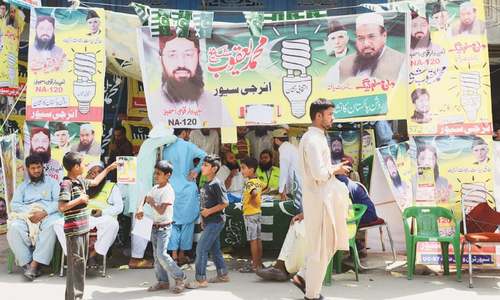IF there were any doubts that Pakistan still remains vulnerable to terrorism, the past week has put an end to them. Three separate attacks in Khyber Pakhtunkhwa and Balochistan and around 150 people killed — including ANP leader Haroon Bilour and Balochistan Awami Party candidate Siraj Raisani — and over 250 injured.
Claims of responsibility for the carnage have come from quarters with which the public is wearyingly familiar. However, whether attacks such as these are carried out by the TTP, the militant Islamic State group, Jamaatul Ahrar, Lashkar-i-Jhangvi or any of the other outfits that have left a trail of destruction in their wake, they all subscribe to an equally violent ideology and have a common objective: to destabilise this country and the region as a whole.
Read: Fringe groups encroach upon old religious parties’ domain
And, as we have seen, Pakistan is particularly susceptible at this moment. The run-up to elections — not to mention polling day itself — can provide the space for such outfits to demonstrate their lethality. For the process of electioneering often brings politicians and crowds of people within close physical proximity, a tempting target for those trying to attack the very foundations of a state.
The vulnerabilities inherent in such a situation require extra vigilance by law-enforcement agencies and minutely worked-out security protocols for candidates’ campaigning schedules. But a lot more is at stake, for vigilance of another, long-term kind is also critical — the kind that underpinned the moribund National Action Plan and aimed at zero-tolerance for extremism in all its manifestations.
Instead, the state is doing the opposite by ‘mainstreaming’ individuals and groups with a history of violence and anti-state actions. There is a clear difference between religio-political parties that engage with the processes of parliamentary democracy, and those that hold it in contempt and will ultimately undermine it.
Certainly, some extremist organisations have been banned, but radicalised elements espousing similar ideologies have been allowed ingress into the body politic through the back door. It is not surprising that many ultra hard-line outfits stay silent in the face of such slaughter as we have witnessed last week and cannot bring themselves to condemn the groups involved.
Even when some ‘mainstreamed’ organisations express grief at the loss of life, their words ring hollow because not only are they affiliated with, or an extension of, banned organisations, but they themselves have not renounced violence.
This is not to say that ‘regular’ political parties are blameless in this disquieting state of affairs. On the contrary, most of them have become well and truly complicit in co-opting extremist elements, with a proven capacity for violence, within their ranks.
For the sake of a few seats, they have appeased and cajoled, and thereby enabled, the forces that will sow further discord along sectarian lines and incite faith-based violence. Are they prepared to live with the inevitably dire consequences that will flow from their expediency?
Published in Dawn, July 16th, 2018













































